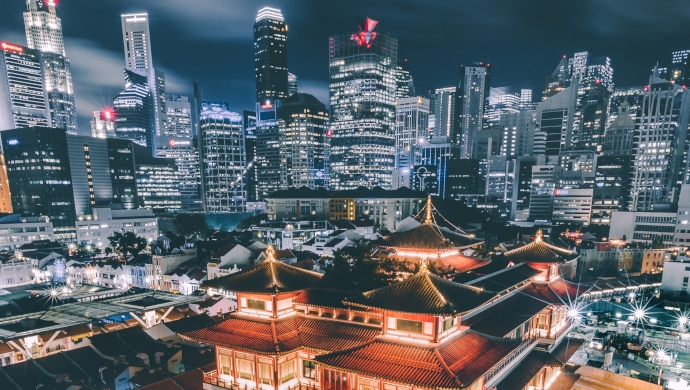While there may be turbulent waters ahead, Singapore’s leaders have reason to to believe better days lay ahead

For the most part, the world’s mature economies are looking ahead to the 2020s with some combination of trepidation and cautious optimism.
The issues faced by large mature economies such as the United States and the Eurozone are quite different from those faced by smaller economies, which by necessity must look abroad for human and fiscal capital.
Singapore offers a clear case study in the challenges and opportunities that smaller economies are likely to encounter in the decade ahead. With the caveat that we cannot know for sure what the future may hold, what can this city-state of some 5.6 million souls expect between now and 2030?
Silicon Valley, Straitside?
On an April visit to the United States, Singapore Finance Minister Heng Swee Keat told The Straits Times and other Singapore-based news organizations that fundamental transformation is necessary to maintain the competitiveness of the city-state’s economy in the years to come.
“I think we must position Singapore as a global Asian node of technology innovation and enterprise,” Heng said.
Speaking from Singapore’s Bridge Forum, in San Francisco, Heng nodded to the successes of America’s Silicon Valley, the ideal upon which most global innovation hubs model themselves.
Heng noted that the Valley’s innovators recognize the disruptive potential of technology, marveling at the “speed and scale at which they are taking this challenge very seriously.” To compete, he added, Singapore’s government and business community “must invest a lot of time and resources.”
Diversity as a Strength
Heng also marveled at the diversity of background and thought that characterizes Silicon Valley’s most successful enterprises.
While Singapore is known for a diverse cohort of Asia Pacific based financial services firms and an education system renowned for producing top-shelf finance graduates, Heng indicated that the city-state’s economy has room for improvement. A small city-state, said Heng, must necessarily look beyond its borders for talent.
Also Read: Aiming at deep tech startups, SGInnovate partners with five new co-investors
“That is another major area we need to look at — how we can grow this talent pool,” he remarked.
The Benefits of Limited Bureaucracy
Singapore does have one significant strength: a unified government with minimal bureaucracy and a streamlined framework for making and implementing policy decisions. This is an important contrast with representative governments in larger mature economies (such as the United States and the United Kingdom) as well as emerging economies (such as India).
Singapore’s low-friction government alleviates a perennial concern for central bank directors: keeping monetary policy responsive amid macroeconomic uncertainty.
“If there is a need for us to use counter cyclical monetary and fiscal policy to manage [a global economic slowdown], we will,” Heng told The Straits times.
The Elephants in the Room
However, central bank policy only goes so far. Singaporean decision-makers like Heng watch developments abroad with some trepidation.
A Bloomberg report on an earlier Heng trip makes clear that the ongoing U.S.-China trade dispute is a source of significant concern for Singapore and other ASEAN economies. So too is the Brexit saga, which remains far from resolution.
Reclaiming the Mantle of Globalization
Ultimately, notes Heng in conversation with the South China Morning Post, Singapore is in a strong position to prosper in an increasingly globalized world — provided it can demonstrate its relevance and appeal to a wide range of international businesses, not just the highly regarded finance firms that remain its core strength.
That includes redoubling incentives to attract new investment and prevent high-profile departures, such as the recent closure of an IBM technology plant. That plant’s closure was partially responsible for Singapore’s cratering electronics exports, a worrying sign in a traditionally strong sector.
“We must expect there will be changes in how companies relocate their operations in different parts of the world,” Heng said, according to the South China Morning Post. “For Singapore, as a small open economy, we must be prepared for changes in the global environment,” he added.
A Dash of Optimism, a Pinch of Caution
It’s clear that Singapore’s government and business community will contend with a host of challenges in the years to come.
In some instances, notably the long-running trade dispute between China and the United States, their ability to directly influence outcomes will be limited. Instead, they’ll need to act strategically, with an eye to minimizing collateral damage and finding silver linings in sub-optimal circumstances.
Also Read: An open letter to the Almost But Never Quite There
In other instances, such as talent acquisition and retention, Singaporean leadership will have a far stronger hand. If Heng’s San Francisco comments are any indication, the city-state’s public and private decision-makers understand what needs to be done to shore up its global competitiveness and position its economy for growth in the years and decades ahead.
That’s not to say any of this will be easy. But, at minimum, it’s encouraging that a consensus appears to be forming around a way forward. The same can’t be said for some other mature economies.
—
Photo by NICHOLAS LOO on Unsplash
The post Singapore startup scene should view next decade with cautious optimism appeared first on e27.